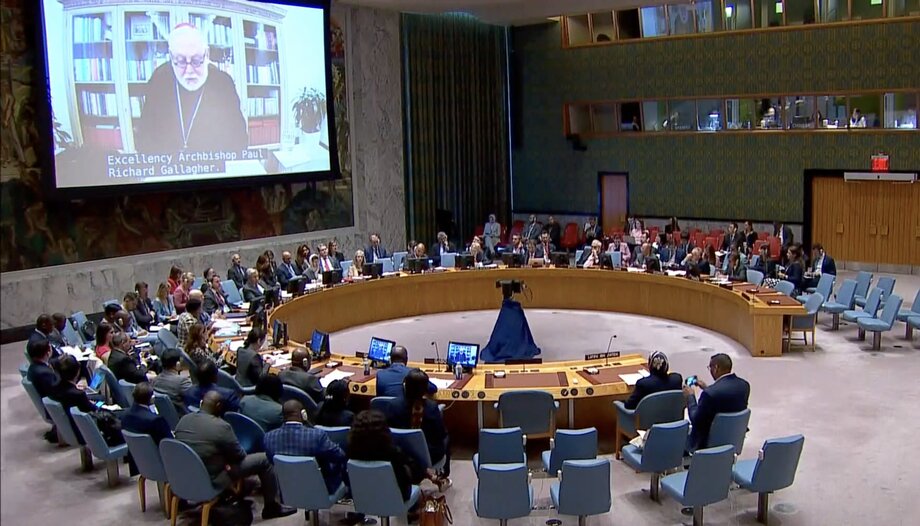The message of Pope Francis, who is undergoing postoperative treatment at the Gemelli Polyclinic in Rome, was read during the meeting of the UN Security CouncilThe meeting was presided over by the Secretary for Relations with States and International Organizations of the Holy See, British Archbishop Paul Richard Gallagher, which is composed of 15 member states.
In the heading, the Pope addressed the secretary general and also the Grand Imam of Al-Azhar.
Before the representatives of five of the most powerful countries on the planet (China, France, Russia, the United Kingdom and the United States of America), permanent members of the CouncilThe Pope, who has been elected as President of the United Nations and of the ten non-permanent countries, including the United Arab Emirates, Brazil, Japan and Switzerland, referred to the "crucial moment" that humanity is going through".
"Peace seems to be succumbing to war," and "we are once again regressing in history, with the rise of closed, exasperated, resentful and aggressive nationalisms, which have ignited conflicts that are not only anachronistic and outdated, but even more violent," the Pope denounced.
"World War III in pieces".
"Conflicts are increasing and stability is more and more in danger. We are living through a third world war in pieces which, the more time passes, the more it seems to expand," the Holy Father said in his address. The UN Security Council itself, whose mandate is to ensure security and peace in the world, "in the eyes of the peoples seems at times impotent and paralyzed," Francis diagnosed.
"But your work, appreciated by the Holy See, is essential for promoting peace, and precisely for this reason I would like to invite you, from the heart, to face common problems by distancing yourselves from ideologies and particularisms, from partisan visions and interests," the Pontiff encourages, because "a single intention must move all this work: to work for the good of all humanity."
In fact, Pope Francis adds, "the Council is expected to respect and implement the Charter of the United Nations with transparency and sincerity, without ulterior motives, as an obligatory point of reference for justice and not as an instrument to mask ambiguous intentions".
"Peace, God's dream for humanity."
Francis then denounced that "in today's globalized world, we are all closer, but that does not make us brothers and sisters. On the contrary, we suffer from a lack of fraternity that is visible in the abundant situations of injustice, poverty and inequality, and in the lack of a culture of solidarity. But the worst effect of this lack of fraternity is armed conflicts and wars, which not only alienate individuals but also entire peoples, the negative consequences of which reverberate for generations".
"As a man of faith," he continued, "I believe that peace is God's dream for humanity. However, I sadly note that because of war this marvelous dream is turning into a nightmare." "It is true that, from the economic point of view, war is more attractive than peace, insofar as it favors profit, but always for a few and to the detriment of the well-being of entire populations," he criticized.
"No to war", peace notes.
In the same tone of urgency used in the speech, and which may reveal the loneliness of a Pope in the face of the russian-ukrainian war and its dramatic consequences, and in the face of other conflicts in the world, the Holy Father was categorical: "The time has come to say seriously 'no' to war, to affirm that wars are not just, only peace is just; a stable and lasting peace, not built on the shaky balance of deterrence, but on the fraternity that unites us".
"Peace is possible if it is truly sought," he added. "It should find in the Security Council its fundamental characteristics, which an erroneous conception of peace makes it easy to forget," he said, quoting St. Paul VI: "peace must be rational, not passionate; magnanimous, not selfish; peace must not be inert and passive, but dynamic, active and progressive as the just demands of the declared and equitable rights of man call for new and better expressions of it; peace must not be weak, useless and servile, but strong, both for the moral reasons that justify it and for the compact consent of the nations that must sustain it."
"We still have time."
In his final words, Pope Francis opened a ray of hope: "We still have time to write a chapter of peace in history. We can achieve this by making war belong to the past and not to the future. The debates within this Security Council are orderly and serve this purpose. I would like to insist once again on a word that I like to repeat because I consider it decisive: fraternity. This cannot remain an abstract idea, but must become a concrete starting point".
"For peace, for every peace initiative and peace process, I assure you of my support, my prayer and that of all the Catholic faithful," Francis concluded. "I pray that not only this Security Council, but also the entire Organization of the United Nations and the entire world community will be able to work together for peace. United NationsThe Pope, all its member states and each of its officials, can render an effective service to humanity, assuming the responsibility of guarding not only their own future, but that of all, with the audacity to renew now, without fear, all that is necessary to promote the fraternity and peace of the entire planet. Blessed are the peacemakers (Mt 5:9).









